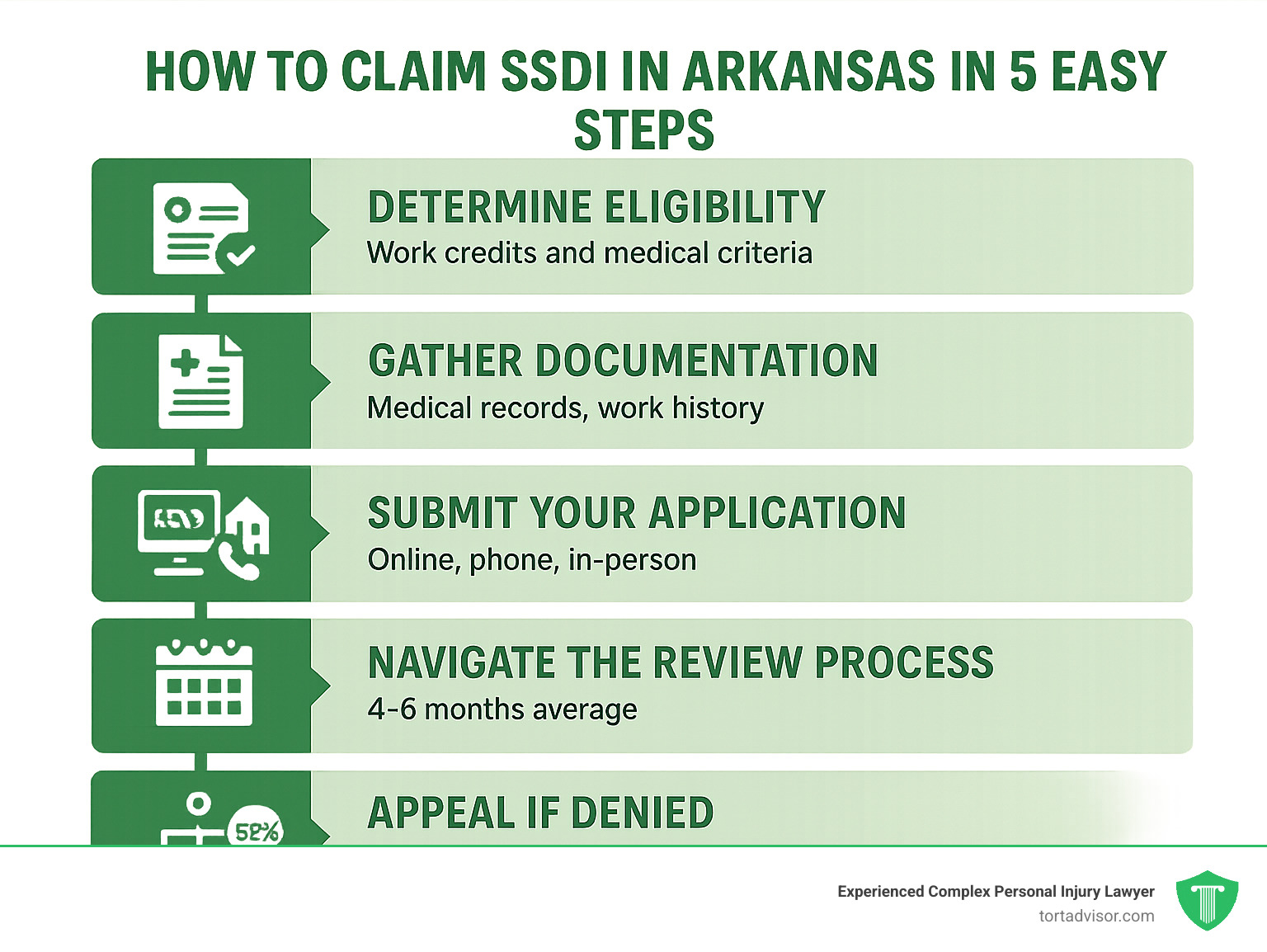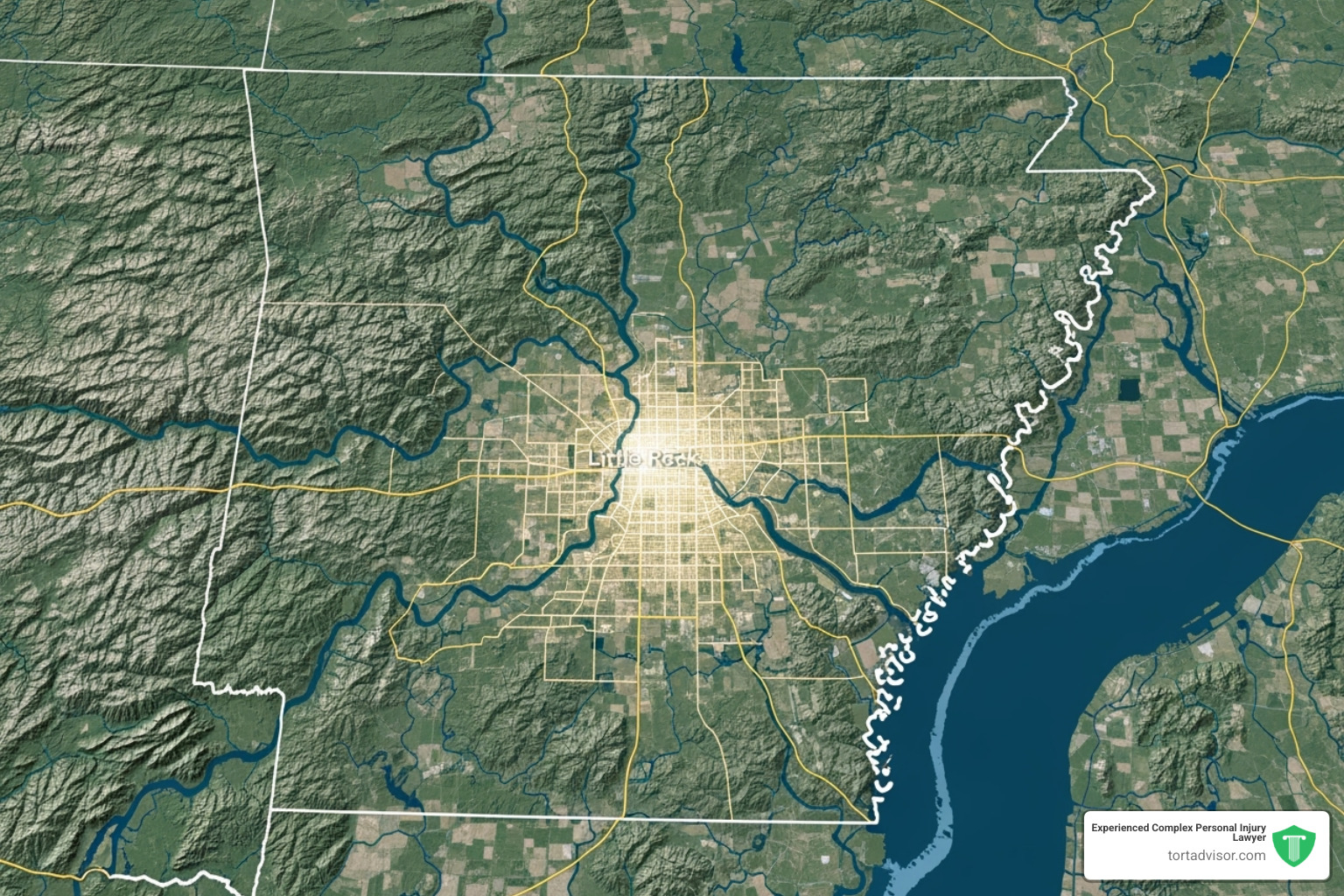


Why Understanding SSDI Claims in Arkansas is Critical for Your Financial Future
How to claim social security disability insurance arkansas follows a five-step process, from determining eligibility to potentially appealing a denial. Here’s a quick overview:
- Determine Eligibility – Meet medical requirements (12+ month disability) and work credit requirements
- Gather Documentation – Collect medical records, work history, and personal information
- Submit Your Application – Apply online, by phone (1-800-772-1213), or in-person at local SSA offices
- Steer the Review Process – Arkansas DDSSA reviews your claim (4-6 months average)
- Appeal if Denied – Use the four-level appeals process, with ALJ hearings having a 52% approval rate
Arkansas presents unique challenges for SSDI applicants. The state ranks 4th highest in the U.S. for its percentage of residents receiving disability benefits, with nearly 200,000 recipients. Despite this, the Arkansas DDSSA approved only 38% of initial claims in 2023.
The process can be overwhelming. Initial denials are common, with about 70% of first-time applications rejected. However, appealing to an Administrative Law Judge (ALJ) significantly improves outcomes, as Arkansas ALJs award benefits in 52% of cases. With an average SSDI payment of $1,499 per month in Arkansas, a successful claim is crucial for financial stability.
I’m Mason Arnao. My background in technology and data management provides unique insights into optimizing complex application processes for better outcomes. I’ve helped many individuals understand the critical steps for how to claim social security disability insurance arkansas correctly the first time.
Step 1: Determine Your Eligibility for Disability Benefits
Before investing time in an application, it’s crucial to confirm you meet the Social Security Administration’s basic requirements. The SSA has strict medical and non-medical rules that you must satisfy to qualify for benefits.
Understanding SSDI vs. SSI in Arkansas
The SSA manages two different disability programs, and knowing which fits your situation is key to a successful claim.
Social Security Disability Insurance (SSDI) is a work-based insurance program. You earn eligibility by paying FICA taxes from your paychecks, which builds up work credits. Your benefit amount is based on your lifetime earnings.
Supplemental Security Income (SSI) is a need-based assistance program. It is for disabled individuals who haven’t worked enough to qualify for SSDI or have very low income and assets. SSI eligibility is based on your current financial situation, not your work history.
While the medical requirements are identical for both, the financial qualifications are completely different.
| Feature | SSDI | SSI |
|---|---|---|
| Eligibility | Work-based insurance program | Need-based assistance program |
| Work Credits Required | Yes – typically 40 credits total, 20 in last 10 years | None |
| Funding Source | Social Security trust funds | General Treasury funds |
| Average Monthly Payment in Arkansas | $1,499 | $571 |
| Health Coverage | Medicare after 24 months | Medicaid immediately |
Key Eligibility Factors for How to Claim Social Security Disability Insurance in Arkansas
The SSA’s definition of disability is stricter than many expect. Your condition must prevent you from doing any substantial work for at least 12 months or be expected to result in death.
- Medical Requirements: Your disability must be a medically determinable impairment, documented with objective evidence like lab tests or clinical findings. If you earn over $1,620 per month (in 2024), the SSA considers this “substantial gainful activity” and will likely deny your claim on non-medical grounds.
- Work History (for SSDI): Your work history determines your eligibility for SSDI. You earn work credits by paying Social Security taxes. Most applicants need 40 credits total, with 20 earned in the 10 years before their disability began. Since these credits can expire, it’s important to apply soon after you stop working to maintain your “insured status.”
You can read The SSA’s definition of disability on their official website to understand the exact criteria. Meeting these specific medical and work history requirements is the first and most important step.
Step 2: Gather All Necessary Documentation
A well-prepared application with thorough documentation can prevent delays and improve your chances of approval. Providing detailed information upfront helps the SSA evaluate your claim efficiently.
Essential Personal and Work History Information
Gather these documents before you begin your application:
- Personal Information: Social Security Number, birth certificate, and proof of citizenship or lawful alien status.
- Bank Information: Your bank’s routing number and your account number for direct deposit.
- Family Information: Names, dates of birth, and Social Security Numbers for your spouse and any minor children.
- Military Service: Your discharge papers (DD Form 214) if you served.
- Other Benefits: Information on any workers’ compensation or other disability benefits you receive.
- Work History: Your W-2 forms or self-employment tax returns for the last two years. You will also need to create a detailed list of jobs you held in the past 15 years, including job titles, dates of employment, and a description of your duties.
Compiling Your Medical Evidence
Objective medical evidence is the foundation of your claim. The SSA needs this information to verify that your condition meets their definition of disability.
- Healthcare Providers: Create a list of all doctors, therapists, clinics, and hospitals you have visited, including their names, addresses, and phone numbers.
- Treatment History: Document a timeline of your medical visits, hospitalizations, and surgeries.
- Medications: Compile a complete list of all your medications, dosages, and the prescribing doctor.
- Test Results: Gather copies of all relevant diagnostic reports, such as X-rays, MRIs, blood work, and psychological evaluations.
- Doctor’s Notes on Limitations: The most powerful evidence is often your doctor’s notes detailing how your condition limits your ability to perform work-related activities (e.g., sitting, lifting, concentrating). If your records lack this detail, ask your doctor to complete a Medical Source Statement or Residual Functional Capacity (RFC) form.
Comprehensive medical evidence provides the proof of disability the SSA requires. For more guidance, you can review the SSA’s publication on More on disability benefits from the SSA.
Step 3: The Complete Guide on How to Claim Social Security Disability Insurance Arkansas
With your documentation gathered, you are ready to file your claim. Arkansas residents have three straightforward ways to submit their application to the SSA.
Applying Online: The Fastest Method
Applying online is often the most efficient option. It is available 24/7 and allows you to save your progress and return later.
The SSA website guides you through the application. Use the Adult Disability Checklist to ensure you have all necessary information. You will also need to complete the Medical Release Form (SSA-827), which authorizes the SSA to request your medical records. If you are applying for SSI, you can start the process online, but an SSA representative will call you to complete it.
You can start your application at Apply for disability benefits online.
Applying by Phone or In-Person
If you prefer speaking with a person, you can apply by phone or at a local SSA office.
- By Phone: Call the SSA at 1-800-772-1213 (or 1-800-325-0778 for deaf or hard of hearing) from 8:00 AM to 7:00 PM, Monday through Friday. Representatives can take your application, answer questions, and schedule an in-person appointment.
- In-Person: Arkansas has 17 Social Security field offices. Applying in person allows a claims representative to review your application with you. It is highly recommended to call ahead and schedule an appointment to avoid long wait times.
You can find the nearest office using the SSA’s locator tool: Find your local Social Security field office.
Regardless of the method, the goal is to submit a complete and accurate application that clearly demonstrates how your disability impacts your ability to work.
Step 4: Navigating the Arkansas Disability Determination Process
After you apply, the SSA first verifies your non-medical eligibility (work credits or income limits). Your file then goes to the Arkansas Disability Determination for Social Security Administration (DDSSA) in Little Rock for a medical review.
What to Expect After You Apply
The DDSSA is a state agency that partners with the SSA to decide if your medical condition qualifies for benefits.
A claims examiner will be assigned to your case. They will review your medical evidence and may request additional records from your providers to determine if your condition prevents you from working. The average initial processing time in Arkansas is four to six months.
If the DDSSA needs more information, they may schedule you for a Consultative Examination (CE) at their expense. Attending this exam is mandatory; missing it can lead to an automatic denial.
You can learn more about the state agency at the Arkansas DDSSA website.
Common Medical Conditions Approved in Arkansas
While every case is unique, certain conditions are frequently approved in Arkansas. The approval depends on the severity of the condition and its impact on your ability to work.
- Musculoskeletal conditions (33.7% of recipients): Conditions affecting bones, joints, and muscles, such as severe arthritis or back problems.
- Mental health conditions (30.6% of recipients): This includes depressive and bipolar disorders (15,651 recipients), intellectual disorders (13,065 recipients), and schizophrenia (5,116 recipients).
- Nervous system diseases (9.2% of recipients): Includes epilepsy, multiple sclerosis, and Parkinson’s disease.
- Circulatory system diseases (7.8% of recipients): Heart conditions, severe hypertension, and other vascular diseases.
Having one of these diagnoses is not an automatic approval. The SSA evaluates how your specific symptoms limit your functional capacity.
Step 5: Appealing a Denial and Seeking Professional Help
An initial denial is not the end of the road. With around 70% of applications rejected initially, the appeals process is a critical part of a successful claim for many. Persisting through an appeal often leads to success.
The Appeal Process: How to Claim Social Security Disability Insurance in Arkansas After a Denial
The SSA has a four-level appeals process. You must file each appeal within 60 days of receiving a denial.
- Reconsideration: A different claims examiner at the Arkansas DDSSA reviews your file and any new evidence. Approval rates at this stage are low (around 14%), and it adds another three to five months to the process.
- Administrative Law Judge (ALJ) Hearing: This is your best chance for approval. An independent judge reviews your case. In Arkansas, ALJs awarded benefits in 52% of cases heard in 2023. You can present new evidence and have witnesses testify. However, the average wait for a hearing was 16 months in 2023. You can review ALJ hearing data from the SSA.
- Appeals Council Review: If the ALJ denies your claim, you can ask the Appeals Council to review the decision. They may approve your claim, send it back to the ALJ, or uphold the denial. This stage can take over a year.
- Federal Court Review: The final step is filing a civil lawsuit in federal district court, which requires an attorney.
Why Hiring an Arkansas Disability Attorney Increases Your Chances
While not required, hiring an attorney dramatically improves your odds. Applicants with an attorney have a 60% chance of approval, compared to just 20% for those without one.
An experienced disability attorney helps by:
- Applying legal expertise: They understand complex SSA regulations and can build a case that meets the specific medical criteria.
- Gathering strong evidence: They work with your doctors to get detailed statements about your work limitations and ensure all paperwork is filed correctly and on time.
- Representing you at hearings: An attorney will prepare you for the ALJ hearing, question witnesses, and present a persuasive legal argument on your behalf.
Most disability attorneys work on a contingency fee basis, meaning you pay nothing upfront. Their fee is legally capped at 25% of your back pay, up to a maximum of $7,200 (as of 2023). This makes expert legal help accessible. A GAO report on attorney representation confirms the positive impact of having a lawyer.
The legal complexities are significant, but you don’t have to steer them alone. Learn how legal representation can help with SSDI Lawsuits.
Frequently Asked Questions about Claiming SSDI in Arkansas
Here are answers to common questions about how to claim social security disability insurance arkansas.
How much does SSDI pay in Arkansas?
Your SSDI benefit is not based on the severity of your disability but on your average lifetime earnings. The SSA calculates this using your entire work history.
In 2023, the average SSDI payment in Arkansas was $1,499 per month. The maximum possible benefit in 2025 is $4,018 per month, reserved for individuals with a history of very high earnings. Your specific payment will be unique to your earnings record. You can get a rough estimate of your potential benefits with an SSDI Settlement Calculator.
How long does the entire SSDI process take in Arkansas?
The timeline varies depending on whether you need to appeal a denial.
- Initial Decision: Approximately four to six months.
- Reconsideration: An additional three to five months.
- ALJ Hearing: The average wait for a hearing date is 16 months.
For cases that go through multiple appeal levels, the total time can easily exceed two years. It is important to apply as soon as possible, as you may be entitled to back pay from the date your disability began.
What is the role of Arkansas Vocational Rehabilitation Services?
Arkansas Rehabilitation Services (ARS) is a state agency that helps people with disabilities prepare for and find employment. The SSA encourages work when possible through “work incentives” that allow you to test your ability to work without immediately losing benefits.
ARS offers services like vocational counseling, job training, and job placement assistance. These can be valuable if your health improves or you adapt to your disability. You can learn more on the ARS website. Applying for SSDI provides support now while keeping future work options open.
Conclusion
Navigating the SSDI claims process in Arkansas is challenging, marked by low initial approval rates and long waits for appeals. While this guide provides a roadmap for how to claim social security disability insurance arkansas, persistence and preparation are key.
The statistics are clear: only 38% of initial applications are approved, but this jumps to 52% at an ALJ hearing. Most importantly, applicants with an attorney have a 60% approval rate, compared to just 20% for those who apply alone.
An experienced attorney understands the evidence requirements and can effectively guide you through the appeals process. Most work on a contingency basis, so you only pay if you win.
Tort Advisor connects individuals with highly skilled disability lawyers who have proven results in Arkansas. They understand the local system and have helped countless residents secure the benefits they deserve.
If you need help with your case, learn more about SSDI Lawsuits and get the expert guidance you need. Your financial future is too important to leave to chance.
Free Confidential Case Evaluation
Complete the short form below to get an immediate FREE case review with an expert in your specific claim. Don't wait, your case could be time sensitive to file a claim.
Related Posts
Discover New Jersey disability benefits: TDI, FLI, SSDI, SSI rates, eligibility, applications & appeals for 2025-2026.
Hire a Depo-Provera lawsuit attorney now. Fight Pfizer for meningioma risks from injections. Free consult, MDL updates & settlements up to $1.5M.
Find top Miami florida car accident lawyers after your 305 crash. Get max compensation, navigate no-fault laws & choose the best experts now!
Diagnosed with cancer after Roundup? Learn about the monsanto roundup lawsuits, eligibility criteria, and how to pursue your claim.
Discover how do you qualify for a hair relaxer lawsuit: criteria, diagnoses, evidence & brands in uterine cancer MDL. Claim review now!
Find the best uber sexual assault lawsuit lawyer: expert guides, MDL experience, proven results & nationwide firms for justice.










